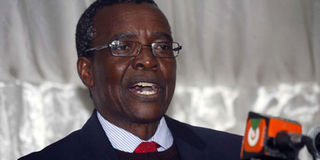It is ordinary Kenyans who suffer when the Judiciary is starved of funds as punishment

Chief Justice David Maraga addressing guests during the launch of Judiciary Electoral Dispute Resolution at the Supreme Court of Kenya on August 3, 2017. PHOTO | EVANS HABIL| NATION MEDIA GROUP
What you need to know:
- IDLO, wrote Foreign Affairs Cabinet Secretary Amina Mohammed, funded researchers who influenced the work of judges.
- The Executive publicly lampoons the Judiciary; judges are sued; their reputations impugned; and purse targeted.
- The letter to IDLO insinuated that its research at the Judiciary was sinister or anti-African.
Before last week, few Kenyans had heard of the Rome-based International Development Law Organisation (IDLO). The public became aware of the non-governmental organisation because Nairobi suspended its operations because of its association with the under pressure Judiciary.
IDLO, wrote Foreign Affairs Cabinet Secretary Amina Mohammed, funded researchers who influenced the work of judges. It was an astonishing turn in the war by the Executive against the Judiciary sparked by the Supreme Court’s September 1 annulment of President Kenyatta’s poll victory declared on August 11.
Six issues immediately emerged. One, the Executive was executing a scorched earth policy against the Judiciary. By this strategy, an advancing or withdrawing military destroys anything that could be used by the enemy. The Executive publicly lampoons the Judiciary; judges are sued; their reputations impugned; and purse targeted.
STATE ASSETS
Two, that Nairobi moved against IDLO on September 13 reveals the swiftness with which President Kenyatta mobilised State assets to overwhelm the Judiciary. Three, the letter to IDLO insinuated that its research at the Judiciary was sinister or anti-African.
Nairobi alleged it was convening a meeting of IDLO’s African hosts to provide them with all “important information they have on the organisation.” Nairobi was subjecting IDLO and Judiciary to the three-year treatment it meted out on the International Criminal Court. But, surely, nobody should know earlier than Kenyans IDLO’s sins against them.
Four, Foreign Affairs sought to give diplomatic respectability to the sustained campaign to erode the public’s trust in the decisional independence of the Judiciary by the Executive and Legislature backed by Jubilee Party operatives. How IDLO-funded research prejudiced court verdicts remains unexplained.
COLLUSION
Five, Nairobi’s action against IDLO and timing aimed to steer observers to see, hear and smell collusion between foreigners and the Supreme Court in the annulment of President Kenyatta’s win. But, curiously, Nairobi did not expel IDLO for such serious interference?
Last, withdrawal of funding is the Executive’s and Legislature’s consistent weapon of choice in fighting and frustrating the Judiciary. Rewind to Parliament on June 24, 2007:
“Mr Angwenyi: On a point of order, Mr Speaker, Sir. The solution is that this Parliament should not give the Judiciary money until it answers the question. It is so easy! The Ministry’s vote will be moved next week.
Mr Speaker: I have not followed what you have said!
Mr Angwenyi: Mr Speaker, Sir, it looks like we are going to be in conflict with the Judiciary. The way to handle the Judiciary is to deny it funds as Parliament. We are also independent. The Judiciary cannot force us to give them funds until they respond to the question.”
CEREMONY ABORTED
The question concerned three judges-designate and Chief Justice who, fully robed, set out for a State House swearing-in ceremony on December 6, 2006 that failed.
Then Mumias MP Wycliffe Osundwa asked Justice Minister Martha Karua why the event aborted. Cryptically and stubbornly, Ms Karua held that the Judiciary, which kept its appointment, should tell her why the ceremony aborted. Mr Jimmy Angwenyi, as most MPs, loves a punching bag.
Fast-forward to April 2015 and Speaker Justin Muturi is asserting Parliament’s oversight role over the Judiciary in an interview. “Institutions that do not submit to parliamentary scrutiny will be denied funding. Judiciary cannot gag Parliament because it represents millions of taxpayers. Its oversight role cannot be blocked by a judicial pronouncement.”
And, last week, the National Treasury asked Parliament to slash Sh1.95 billion from the Judiciary’s budget to fund the October 26 repeat presidential poll. As was the case in 2014, 2015 and 2016, lawmakers will readily reduce the Judiciary’s budget. The message to Chief Justice David Maraga could not be clearer: Your court ordered this poll, now pay for it.
CONSTITUTION
What does this consuming campaign mean for Kenya’s judges? As per the late Chief Justice of India P.N. Bhagwati: “Judges should be of stern stuff and tough fibre, unbending before power, economic or political, and they must uphold the core principle of the rule of law which says “Be you ever so high, the law is above you”… It is the principle of independence of the judiciary which must be kept in mind when interpreting the relevant provisions of the Constitution.”
And this is for the Executive and Legislature. As Chief Justice Maraga and Dr Willy Mutunga before him have argued, it is ordinary Kenyans who suffer when the Judiciary is starved of funds as punishment. So, why punish Kenyans in order to frustrate judges?
Opanga is a commentator with a bias for politics [email protected]





